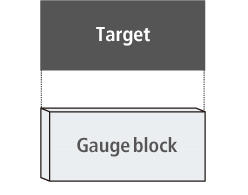Measurement FundamentalsWhat Is Measurement?
“Measurement” is the act of determining a target's size, length, weight, capacity, or other aspect. There are a number of terms similar to “measure” but which vary according to the purpose (such as “weight,” “calculate,” and “quantify.”) In general, measurement can be understood as one action within the term “instrumentation.”
| Measurement | • To show measured results using values and symbols. • To use measurement tools. |
|---|---|
| Instrumentation | • To determine an amount in order to achieve a specific purpose. • To use measurement tools as necessary. |
It is also appropriate to say that measurement is done by a worker using a measurement system, and instrumentation is done by a technician. This website focuses on measurement as it pertains to the design, manufacturing, and inspection process of machine components.
Difference Between Measurement and Inspection
Measurement refers to the quantification of results obtained by using measurement tools. As such, inspection refers to comparing the values obtained through measurement with available references to determine whether a product is acceptable or not. When measuring a length using a ruler, it is possible to make some sort of decision based on the value, such as “The measurement is a little too long/short.” This determination is another way of saying, “Based on the value obtained using a ruler (measurement), it has been determined that this value is slightly longer (or shorter) than the length of interest.” Although there is often no need to use these definitions separately, it is a good idea to at least recognise the difference between the two.
Differences in Measurement Methods
Measuring a target can be done through either direct measurement or indirect measurement.
Direct Measurement
Direct measurement is measurement done by bringing the target into contact with the measurement system to read the length, height, or other aspect directly. Although direct measurement allows measurement results to be known as they are, errors may occur depending on the skill of the person doing the measurement.

Indirect Measurement
Indirect measurement is done, for example, by using a dial gauge to measure the height difference between a measurement target and a gauge block and using that height to indirectly determine the target's height. Because this type of measurement is based on a reference, indirect measurement is also referred to as “comparative measurement.”







